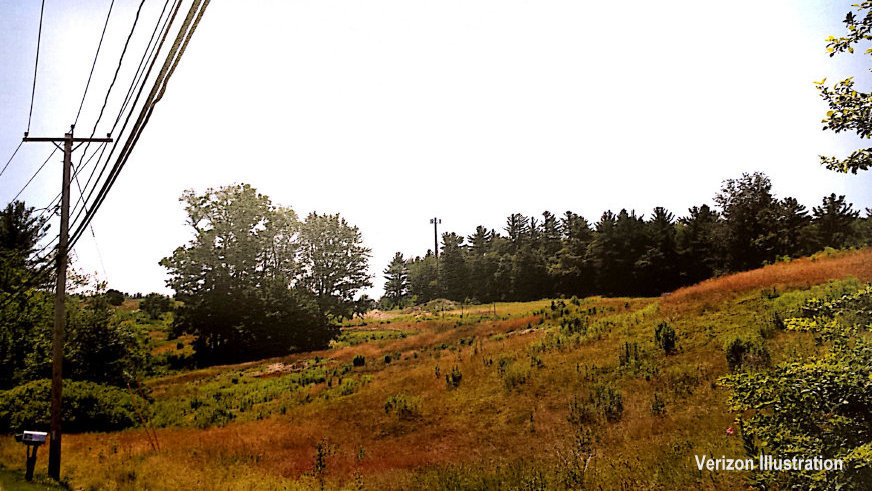
Clarksburg Planners Want Justifications for Cell Tower Variance
CLARKSBURG, Mass. — The Planning Board is asking for more justification on several proposed variances to the installation of a Verizon cell tower at the former North Adams Country Club.
The proposal was presented at last week's board meeting, as Pittsfield Cellular Telephone Co., doing business as Verizon, is seeking a special permit under the town's new wireless communications bylaw.
The board lacked a quorum to make any decisions but Chairman David Sherman and Planner Gary Pierce reviewed the application and information in anticipation of meeting again on Thursday, Aug. 11.
They specifically asked for greater justification for requested variances in setback and height, and the need for another tower less than 5 miles from an existing one.
The 125-foot monopole would be set on a high elevation west of the clubhouse at 641 River Road, 1.7 miles as the crow flies from the tower on Florida Mountain and only 35 feet from a neighboring property.
Attorney Michael A. Fenton of Shatz, Schwarz and Fentin PC, representing Verizon, said the tower complies with all the town's design standards except for two subsections.
"With the new setback requirement being 150 percent of the tower height, we're at a 120 feet to meet the necessary adat and coverage needs for the town," he said. "As a result the setback is 180 feet. We can't comply with that and also meet the town's goals minimizing the visual impact of the tower."
The other design standard is that the tower shall not exceed 20 feet above the average tree line. It exceeds that, again, said Fenton, because of coverage and visibility.
"We designed the tower to be the least visually impactful for what we need for our coverage needs," he said.
The town's bylaw does not prohibit towers in close proximity but does encourage use of existing facilities. A special permt can be approved after an "applicant has proven that it cannot provide adequate coverage or capacity by installing its equipment on an existing tower or structure or by using repeaters in conjunction with existing facilities."
Sherman asked that at the next meeting, the company provide more information on actual coverage area and reasoning for the tower's location and height.
"Where it doesn't meet the design standards, we the board, obviously, will have to make a decision," he said.
Fenton said he could not speak to coverage other than what was provided to the board but he would have the radio frequency engineer Jay Latorre, who wrote the submitted report, on hand to answer any questions.
The facility would have a 50-foot by 50-foot fenced perimeter and be monitored round the clock by a security system. Traffic would be miminal, with a technician checking monthly to assure its funcitioning. Access would be by a 12-wide gravel drive of the existing driveway.
The land would be leased from BBD LLC and the estimate to remove it was $76,000. Fenton said a surety would be posted to cover decommissioning.
Verizon did a balloon float and field reconnaissance on July 6 to evaluate the conditions and visibility, taking photographs of the 4-foot diameter balloon from several perspectives. It also developed a number of photo-simulations. According to Verizon, visibility is minimized by trees and topography in most directions.
"We anticipate some limited seasonal views (i.e., when the leaves are off the deciduous trees) of the Facility may be seen from the streets and properties to the east (Daniels Road/East Road).
Fenton said Verizon was willing to do another two-day balloon test in accordance with the new bylaw but cautioned that weather and other issues may hamper its usefulness. The test would have to be scheduled in advance, abuttors notified and the test posted in local news seven days prior.
"On occasion, we can get out there very quickly ... [we] will have to just come ... and sort of irrespective of the weather they will plant the thing and it will go up," he said. "But if it's a windy day, and it's not that effective, it will sort of be what the people see and it won't be as accurate as if had the flexibility to choose the day."
Fenton said the project has been determined in its initial findings through the MEPA process not to require an environmental impact report to go through the Conservation Commission.
The meeting was attended by the abuttor, Dan Tanner, whose farmland borders the proposed cell tower site.
"It's within 35 feet. It doesn't really excite us. Would you want a cell tower put on your property? Or have your neighbor put a cell tower on their property abutting you and you don't see any financial benefit out of it. If anything [the land] tends to lose value. That's our main concern."
He said he and his father planned to attend future meetings.
In other business, the board met briefly with Colleen DeBenedetto of Clean Energy Collective, operating as CEC Solar 1081 LLC, on a surety for a bond for the solar array planned on River Road. DeBenedetto said the company would like to begin construction and is the process of completing the paperwork for bonding.
Tags: cell tower, Planning Board, Verizon,















